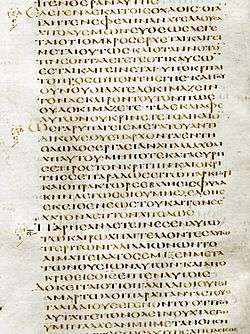Luke 12
| Luke 12 | |
|---|---|
.jpg) Fragment of Uncial 0191, 6th century bilingual Greek-Coptic manuscript of the Gospels with text of Luke 11:51-12:5 | |
| Book | Gospel of Luke |
| Bible part | New Testament |
| Order in the Bible part | 3 |
| Category | Gospel |
Luke 12 is the twelfth chapter of the Gospel of Luke in the New Testament of the Christian Bible. It records a number of teachings and parables told by Jesus Christ to "an innumerable multitude of people ... gathered together".[1][2] The book containing this chapter is anonymous, but early Christian tradition uniformly affirmed that Luke composed this Gospel as well as the Acts of the Apostles.[3]
Text

- The original text is written in Koine Greek.
- Some most ancient manuscripts containing this chapter are:
- Papyrus 75 (written about AD 175-225)
- Papyrus 45 (c. 250)
- Codex Vaticanus (325-350)
- Codex Sinaiticus (330-360)
- Codex Bezae (c. 400)
- Codex Washingtonianus (c. 400)
- Codex Alexandrinus (c. 400-440)
- Codex Ephraemi Rescriptus (c. 450; extant: verses 1-3)
- This chapter is divided into 59 verses.
Structure
The New King James Version organizes this chapter as follows (with cross references to parallel sections in Matthew's gospel):
- Luke 12:1-3 = Beware of Hypocrisy (Matthew 10:26-27)
- Luke 12:4-7 = Jesus Teaches the Fear of God (Matthew 10:28-31)
- Luke 12:8-12 = Confess Christ Before Men (Matthew 10:32-33; Matthew 10:19-20)
- Luke 12:13-21 = The Parable of the Rich Fool
- Luke 12:22-34 = Do Not Worry (Matthew 6:25-34,19-21)
- Luke 12:35-48 = The Faithful Servant and the Evil Servant (Matthew 24:43-51)
- Luke 12:49-53 = Christ Brings Division (Matthew 10:34-36)
- Luke 12:54-56 = Discern the Time
- Luke 12:57-59 = Make Peace with Your Adversary (Matthew 5:25-26)
An innumerable multitude
- An innumerable multitude of people had gathered together [1]
Scottish minister William Robertson Nicoll suggests this is "the largest crowd mentioned anywhere in the Gospels" [4] but Jesus speaks "first of all" to his disciples,[1] only turning to the multitude in verses 14-21, in response to a question from someone in the crowd, and again in verses 54-59. Peter asks (at verse 41) whether the parable of the faithful servant is addressed solely to the disciples or to the wider multitude (παντας, pantas: everyone).[5]
Parable of the Rich Fool

Among the canonical gospels of the New Testament, this parable of Jesus appears only in Luke's Gospel. The parable reflects the foolishness of attaching too much importance to wealth. An abbreviated version of the parable also appears in the non-canonical Gospel of Thomas (Saying 63).[6]
The parable has been depicted by artists such as Rembrandt (illustrated), Jan Luyken, James Tissot, and David Teniers the Younger.
Do Not Worry
Seek the kingdom of God
- But rather seek ye the kingdom of God; and all these things shall be added unto you.[7]
Similarly in Matthew 6:33, with a slightly longer text: Seek ye first the kingdom of God, and his righteousness; and all these things shall be added unto you.[8]
I came to bring fire to the earth
- "I came to bring fire to the earth, and how I wish it were already kindled!" [9]
The Cambridge Bible for Schools and Colleges makes reference to an ‘unwritten saying’ of Christ, He who is near me is near the fire, which is recorded by Ignatius, Origen and Didymus.[10]
Make peace with your adversary
The final verses of the chapter (verses 57-59) make use of an illustration based on a pecuniary claim [11] heard before the magistrates' bench (Greek: ἄρχοντα, archonta, a Lukan word also appearing four times in the Acts of the Apostles):[12]
- Even of yourselves, do you not judge what is right? [13]
See also
- Sermon on the Mount
- Sermon on the Plain
- Ministry of Jesus
- Parables of Jesus
- Other related Bible parts: Matthew 5, 6, 10, 24
References
- 1 2 3 Luke 12:1
- ↑ Halley, Henry H. Halley's Bible Handbook: an Abbreviated Bible Commentary. 23rd edition. Zondervan Publishing House. 1962.
- ↑ Holman Illustrated Bible Handbook. Holman Bible Publishers, Nashville, Tennessee. 2012.
- ↑ Nicoll, W. R., Expositor's Greek Testament on Luke 12, accessed 19 June 2018
- ↑ Luke 12:41
- ↑ Gospel of Thomas: Lamb translation and Patterson/Meyer translation
- ↑ Luke 12:31
- ↑ Matthew 6:33
- ↑ Luke 12:49
- ↑ Cambridge Bible for Schools and Colleges on Luke 12, accessed 19 August 2018
- ↑ Meyer, H. (1880), Meyer's N T Commentary on Luke 12, accessed 23 June 2018
- ↑ Englishman's Concordance, ἄρχοντα, accessed 23 June 2018
- ↑ Luke 12:57
External links
| Preceded by Luke 11 |
Chapters of the Bible Gospel of Luke |
Succeeded by Luke 13 |